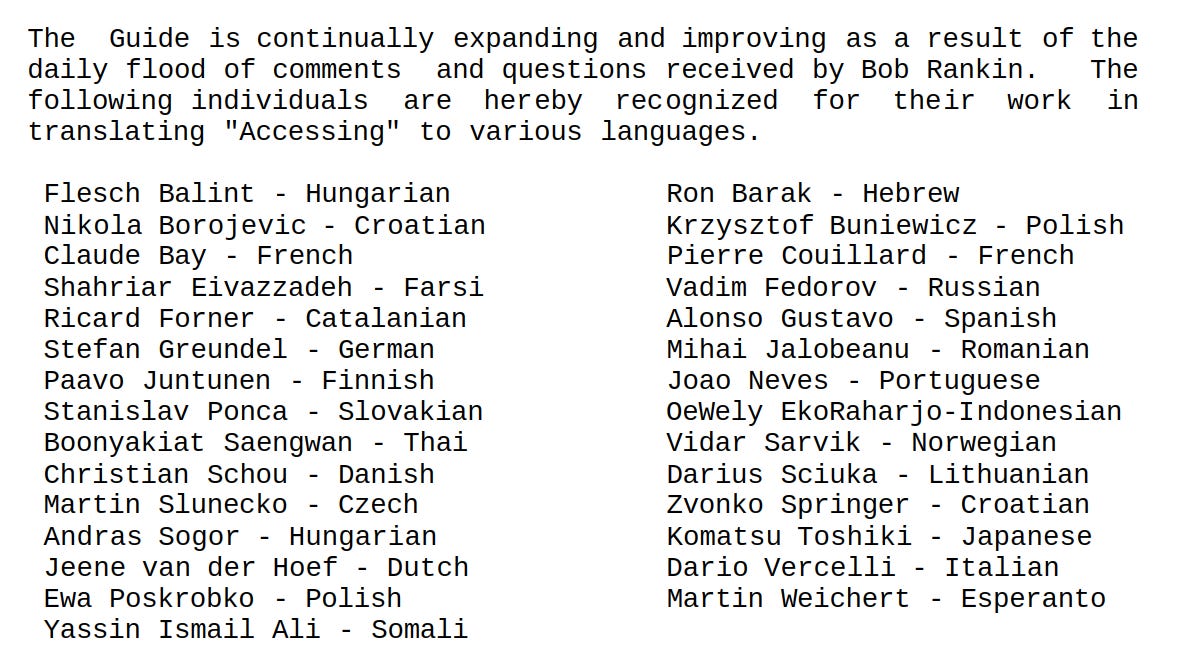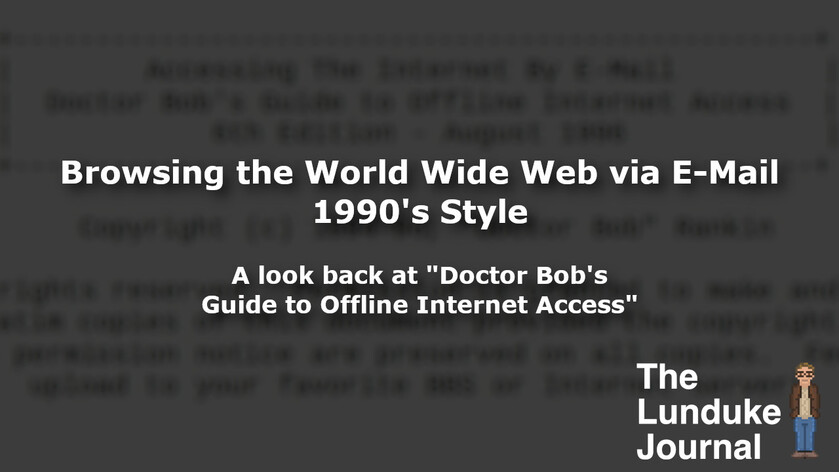Back in the 1990s… browsing “The Web” was a distinctly different experience for many people.
Some had a limited amount of time which they could be “On-Line”. Others had access to Internet E-Mail, often through a local dial-up BBS… but not the ability to use a graphical Web Browser. (Yes… “E-Mail” has a dash in it… that’s how it was in the beginning — as it is “Electronic Mail” — and that’s how it shall forever stay.)
Luckily, a solution presented itself:
“Doctor Bob’s Guide to Offline Internet Access”
First published in 1994 by “Doctor Bob” Rankin, the guide to offline Internet access focused on ways you could fetch (and interact with) various types of Internet servers entirely via E-Mail.

The sheer amount of different types of Internet servers that could be used via E-Mail was nothing short of amazing: FTP, Gopher, Jughead, Usenet, Finger, Whois, Nslookup, Traceroute, and (of course) the “World Wide Web” were all usable (to one degree or another).
“Doctor Bob” continued to update and release new versions of the guide until 1999, when he handed duties over to Gerald E. Boyd. The final version (to my knowledge) was released in 2002 and is available in full at faqs.org.
But… HOW?!
The way all of this worked was actually pretty ingenious in its simplicity.
There were servers — quite a lot of them — that you could email. In the body of your email you would include any of a number of different commands. The server would receive your email… and send a response back to you with the result of your command.
You could almost think of these “Web via E-Mail” servers as command line tools… that you use via E-Mail. Most of them even included a “Help” command that would email you an introduction and list of available commands.
One of the most popular (and earliest) servers, known as Agora, was developed by the World Wide Web Consortium — with the final release (0.8b) published in 1997.
Let’s say, for example, you want to read the contents of “Lunduke.com”. Easy peasy! You’d simply email the Agora server of your choice (Doctor Bob’s included several to get people started) with the following in the body of your email:
send http://lunduke.com
You would then get an email response (sometimes quickly… sometimes with a large lag time) with the text-mode version of that webpage.
Fun tidbits: The Agora Web Browser was written in Perl and ran on DEC Alpha servers. It was based (in very large part) on the second Web Browser ever created: the portable “Line Mode Browser” from 1990: a text-mode tool for fetching webpages from a command line.
Searching the Web via a search engine was possible via Agora, and typically was done by including a fully formed URL (with all of the search words) in the email. For example, the following would use the Lycos Search engine to search for “linux sucks”:
https://search.lycos.com/web/?q=linux+sucks
Not the most user-friendly method in the world, but it was functional.
Later, more advanced, “Web via E-Mail” servers would include some additional features to make this all a bit easier.
For example, “GetWeb” and “WWW4MAIL” (two of the most popular, full featured servers) would allow you to perform the same search (for "linux sucks") by sending the following email:
SEARCH LYCOS linux sucks
See? Much nicer.
The Impact of Doctor Bob’s Guide
Many modern Internet users may have never even been aware of Doctor Bob’s Guide to Offline Internet Access”… just the same, its impact was far reaching.
People, across the world, utilized the techniques in the guide to gain some form of “Web Access” in areas with little availability of Internet Access. In fact, its usage was so widespread that various versions of the guide were translated to 32 different languages.

All The Servers are Gone
To my knowledge, no such “WWW via E-Mail” servers (Agora, GetWeb, or WWW4MAIL) are still in operation. In fact, even finding the source code for some of these servers has proven challenging.
There have been a few attempts at writing a new such server over the years — including “newAgora” written in Python. However, none seem to have any longevity to them (newAgora was last updated 11 years ago).
This isn’t terribly surprising, as the “WWW” has become increasingly difficult to use via text-mode browsers over the last 20 years. Add on top of this the continually shifting SSL requirements of most servers… and it has simply become too complex of a task. Especially considering the lack of interest in supporting such functionality.
Just the same, it’s sad when these sort of systems are no longer functional. A whole new generation of people will never have the opportunity to experience what it was like to “browse the web” entirely via E-Mail.















